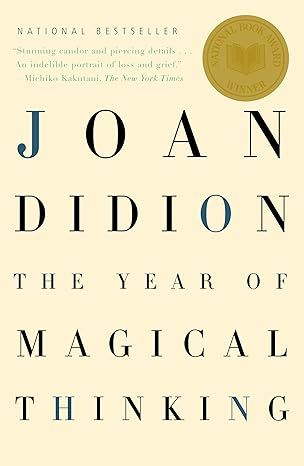
The Year of Magical Thinking: National Book Award Winner
4.4 out of 5
11,748 global ratings
NEW YORK TIMES BESTSELLER • NATIONAL BOOK AWARD WINNER • From one of America’s iconic writers, a stunning book of electric honesty and passion that explores an intensely personal yet universal experience: a portrait of a marriage—and a life, in good times and bad—that will speak to anyone who has ever loved a husband or wife or child.
Several days before Christmas 2003, John Gregory Dunne and Joan Didion saw their only daughter, Quintana, fall ill with what seemed at first flu, then pneumonia, then complete septic shock. She was put into an induced coma and placed on life support. Days later—the night before New Year’s Eve—the Dunnes were just sitting down to dinner after visiting the hospital when John Gregory Dunne suffered a massive and fatal coronary. In a second, this close, symbiotic partnership of forty years was over. Four weeks later, their daughter pulled through. Two months after that, arriving at LAX, she collapsed and underwent six hours of brain surgery at UCLA Medical Center to relieve a massive hematoma.
This powerful book is Didion’ s attempt to make sense of the “weeks and then months that cut loose any fixed idea I ever had about death, about illness ... about marriage and children and memory ... about the shallowness of sanity, about life itself.
About the authors
Joan Didion
Joan Didion was born in Sacramento in 1934 and graduated from the University of California, Berkeley, in 1956. After graduation, Didion moved to New York and began working for Vogue, which led to her career as a journalist and writer. Didion published her first novel, Run River, in 1963. Didion’s other novels include A Book of Common Prayer (1977), Democracy (1984), and The Last Thing He Wanted (1996).
Didion’s first volume of essays, Slouching Towards Bethlehem, was published in 1968, and her second, The White Album, was published in 1979. Her nonfiction works include Salvador (1983), Miami (1987), After Henry (1992), Political Fictions (2001), Where I Was From (2003), We Tell Ourselves Stories In Order to Live (2006), Blue Nights (2011), South and West (2017) and Let Me Tell You What I Mean (2021). Her memoir The Year of Magical Thinking won the National Book Award for Nonfiction in 2005.
In 2005, Didion was awarded the American Academy of Arts & Letters Gold Medal in Criticism and Belles Letters. In 2007, she was awarded the National Book Foundation’s Medal for Distinguished Contribution to American Letters. A portion of National Book Foundation citation read: "An incisive observer of American politics and culture for more than forty-five years, Didion’s distinctive blend of spare, elegant prose and fierce intelligence has earned her books a place in the canon of American literature as well as the admiration of generations of writers and journalists.” In 2013, she was awarded a National Medal of Arts and Humanities by President Barack Obama, and the PEN Center USA’s Lifetime Achievement Award.
Read more
Reviews
Melo
5
Perfect timing…
Reviewed in the United States on June 1, 2024
Verified Purchase
Loved this easy to read, yet deeply engaging book. I read it after my husband died. Somehow it gave me great comfort to read.
Hugh B
5
Joan Didion at her best
Reviewed in the United States on May 16, 2024
Verified Purchase
What a book!
Wayne
5
beautiful work on grieving
Reviewed in the United States on May 7, 2024
Verified Purchase
I read this in a couple days after losing my best friend and looking for a way to make sense of the grief and loss. Joan Didion is a master writer and I recommend this book.
Kcorn
5
Deserves to become a classic memoir about grief and loss
Reviewed in the United States on October 6, 2005
Verified Purchase
I stayed up almost all might just to finish reading it, unable to put this down, although I confess I had to keep a box of tissues nearby. I've lost 5 people in the last few years and, just recently, another friend and so I related very strongly to this book.
Didion's unflinching account of the sudden loss of her husband (which occurred while their only child was in a coma in a hospital (!)) deserves to be a classic in the genre of books written by and for those who are grieving. It is hard to find books like this, which are both honest but not overly sentimental, not resorting to the tropes which seem to surround death. She doesn't offer vague platitudes or advice. She simply relates her very personal experience, including the inevitable vulnerability, unexpected moments of being blindsided by memories and sudden tears, etc.
She covers all the bases, including the kind of insanity that can seize one in the throes of grief, those moments when you forget the person is actually dead, when you turn to speak to him or her as you normally would at a certain part of the day or reach for the phone to share the latest news.
The book is raw. If you're looking for religous or spiritual guidance and inspiration, this is not the book for you. As Didion herself noted, writing about the book recently, it was intentionally written "raw". I assume she didn't want to wait, to distance herself from the intensity of the experience as she wrote it down, quite unlike many other books she has written. Raw or not, it wasn't sloppy, overly sentimental or complete despairing.
It was simply honest, heartwrenchingly so, and Didion doesn't deviate from communicating, in absolute striking detail, the sense of alienation and disorientation that separates mourners from those who seem to be living "normal" lives. Grief is its own territory, separate from so-called normalcy. In so many ways, it is an illness, an affliction of the spirit and not one that can be cured in any one way.
An aside- the photo of Didion inside the dustjacket is haunting. No question that those are the eyes of someone who has been scraped to the core, wounded and, presumably, still recovering. There is something beautiful in that portrait and, oddly, comforting. It is the face of a survivor, however hard it might be to live as one.
This book will remain on my bookshelf and I expect I'll be thumbing through it for solace time and again. Reading it was both painful and cathartic and strangely comforting, with an intensity that left me awestruck. I am still amazed that she was able to produce such a beautifully written book in the throes of so much pain.
Read more
847 people found this helpful
Jon Linden
4
"I Never Saw A Wild Thing Sorry For Itself"
Reviewed in the United States on January 2, 2006
Verified Purchase
In an extraordinary exposition, Ms. Didion describes her experiences during the year after her husband's untimely demise. The book is a wonderfully clear and adept elucidation of her feelings and thoughts during this period. The wonder of her ability to clarify this period in her mind enough to write about it is the mark of an extraordinary author.
Her story starts just before the death of her husband and his death from a myocardial infarction is described in detail. In addition, at the same time that her husband is dying/died, her daughter is in the hospital with an incredibly life threatening illness. The juxtaposition of the tale of her daughter's medical travails and her thoughts on her husband's death make the tale ever so much more poignant.
She covers a very large amount of ground in the grief and bereavement period. Her thoughts about what her husband last said, and of what she thought about in her past life with a man she was married to for 40 years; and her thoughts as she tries to recover from the lose of a life long partner are described with tenderness and beauty.
Most interesting are the comments on "self-pity" that she makes. She quotes D.H. Lawrence's famous 4 line poem:
"I never saw a wild thing
sorry for itself,
A small bird will drop frozen dead from a bough
without ever having felt sorry for itself."
In this description of self-pity, she belies Lawrence's contention. But not completely, as she comments on self-pity as a state one wants to hang onto, while at the same time realizing how pathetic the state. But she resolves to bring herself back to the point of normalcy; of being a regular person to the extent at least that she can interact normally with others.
While her thinking does not in any way really seem "Magical" it does seem revealing. While her particular story of grief and recovery is very personal, it is also very indicative of what people feel in her situation. It is said that nothing is more severe than losing a spouse. Ms. Didion buttresses this contention with her book. Nothing quite disorients a person as much as the death of the one whom one has shared their life with, the most intimate moments of that life. The book is highly recommended to all people. It is a learning experience for those who have not experienced it, and it is a reiteration for those who have, but with a certain clarity that is not usual for people to develop.
Read more
10 people found this helpful
Best Sellers

The Great Alone: A Novel
4.6
-
152,447
$5.49

The Four Winds
4.6
-
156,242
$9.99

Winter Garden
4.6
-
72,838
$7.37

The Nightingale: A Novel
4.7
-
309,637
$8.61

Steve Jobs
4.7
-
24,596
$1.78

Iron Flame (The Empyrean, 2)
4.6
-
164,732
$14.99

A Court of Thorns and Roses Paperback Box Set (5 books) (A Court of Thorns and Roses, 9)
4.8
-
26,559
$37.99

Pretty Girls: A Novel
4.3
-
88,539
$3.67

The Bad Weather Friend
4.1
-
34,750
$12.78

Pucking Around: A Why Choose Hockey Romance (Jacksonville Rays Hockey)
4.3
-
41,599
$14.84

Start with Why: How Great Leaders Inspire Everyone to Take Action
4.6
-
37,152
$9.99

Tomorrow, and Tomorrow, and Tomorrow: A novel
4.4
-
95,875
$13.99
